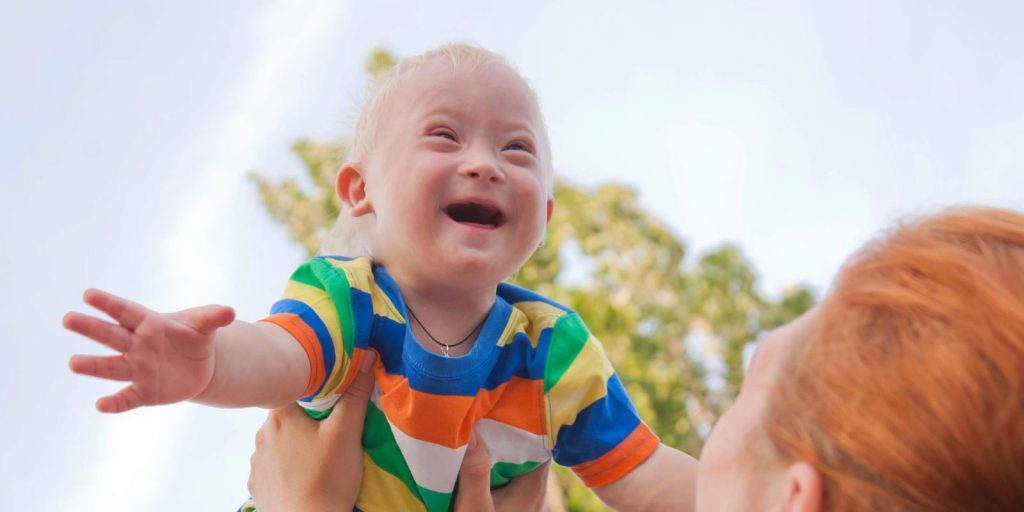
New parents
Congratulations on the birth of your baby!
If your baby is healthy, his/her needs will be just like other babies. You don’t need to do anything different or special at this stage.
We know it can be difficult at first to see past the diagnosis to your baby’s individual personality. Take time to listen and get to know and enjoy him/her.
A loving secure environment is the most important thing that you can give your baby at this time.


New parents are often concerned that their baby will miss out if they are not immediately providing some form of regular stimulation. We understand this feeling, it is very natural, but don’t be hard on yourself. Give yourself time to adjust to your new baby. Interact with him/her. The rest can come later!
Your baby's health.
Some health conditions are more common in children with Down syndrome. It is important that you are aware of this and if possible that your baby is screened for these.
Some countries have systems in place to ensure this takes place.
Learn about health conditions that are more likely to effect a child with Down syndrome in our ‘Child health’ section.

Local support.

Meeting other parents locally can give you some much needed moral support and advice from like-minded people.
Our members can help you to connect with other families who have a child with Down syndrome.
Find your nearest organisation on the ‘Contact us’ page.
Feeding your baby.
Many babies with Down syndrome are able to breastfeed successfully from birth.
A few babies have medical problems which affect feeding.
Weaning your baby is likely to be much like weaning any other child, but sometimes they can be slower to learn how to suck, chew and swallow.


Some babies with Down syndrome are particularly sensitive to different textures and prefer smoother foods and familiar flavours. As with any child, the priority is to provide a healthy and balanced diet.
Ask a qualified professional, for example, a health visitor or speech and language therapist with expertise in feeding, if you are worried or need advice on feeding and weaning.
Development.
Children with Down syndrome develop at different rates and in different ways – they have individual strengths, interests, talents and needs.
They are helped by being socially included in their families, schools and communities.
They are helped to learn new skills by being shown how to do them and by having enjoyable ways to practice.
Like all children, they benefit from high expectations and support at home and at school.


Every child with Down syndrome will have a certain level of intellectual disability. The intellectual disability affects a child’s ability to learn compared with other children of their age, it does not mean they cannot learn.
Children with Down syndrome generally take longer to reach developmental milestones and they will need some additional support.
The way the syndrome affects a person’s development, learning and health varies widely.
The level of support that a person with Down syndrome needs as they grow up and throughout their lives will be different from person to person.

Early intervention.

‘Early intervention’ (including speech and physiotherapy) can help the development of children with Down syndrome.
Ask your doctor, local health professional or local support group what is available in your area.
Our member organisation in your country may be able to direct you to these services. Find their contact details on the ‘Contact us’ page.
The intervention that your child receives will depend on
their needs and local availability.
How can I help my baby develop?
Spending time in face to face interaction with your baby is one of the best ways to help your baby learn.
Copy your baby’s noises and expressions and wait for your baby to respond to you. Be patient.
You can show your baby new expressions, noises, things to touch and feel and see what your baby thinks of these.


Play together.
Follow your child’s lead and support their learning in sensitive and responsive ways.
Get into your child’s world, copying his/her play with your own toy that is the same as his/hers, repeating things your child enjoys, and taking turns.
Showing your child you are having fun, and being animated and playful are just some of the ways you can help your child learn.
As you play together you can show your child the next step and encourage your child to copy you.
We know that children with Down syndrome learn especially well by being shown things.
The most important experiences for a child with Down syndrome come from being a member of a happy, loving, and active family – and from doing all the things that families normally do.
